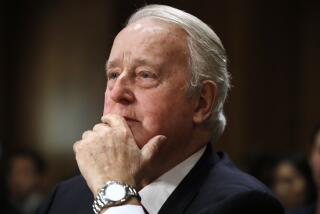Fight Apartheid by Helping Its Victims, Thatcher Tells Commonwealth Leaders
VANCOUVER, Canada â British Prime Minister Margaret Thatcher told the opening session of the Commonwealth heads of government conference Tuesday that the way to fight apartheid in South Africa is through aid to its victims and to neighboring black states, not through sanctions.
She pointed out that her governmentâs disagreement with nearly all of the other 48 Commonwealth members over the use of economic sanctions against the Pretoria regime is well known.
âAnd there is nothing to be gained by parading our differences,â Thatcher told the other leaders. âSo it will be much better if the message which goes out from our meeting is one of agreement on positive action, action to help black South Africans, in particular through education and training, action to help the front-line states reduce their dependence on South Africa.â
Preference Underlined
The latter was a reference to South Africaâs neighbors, some of whose economies are almost entirely at the mercy of Pretoria. She underlined her preference for this approach by specifically welcoming a delegation from Mozambique, a non-Commonwealth front-line state whose Marxist government is fighting a South African-supported rebel group.
As a sign of its opposition to apartheid, Britain gives financial aid to Mozambique, as well as military training, despite the Marxist ideology of the regime governing the former Portuguese colony.
Prime Minister Brian Mulroney of Canada, a leader among the Commonwealth members in the fight for tougher sanctions against South Africa, declined to take on Thatcher in public. His speech Tuesday was a model of indirection and diplomatic niceties, in which he said that âthe Commonwealth should agree on fundamental and increasingly effective measures to deal with the situation.â
Even the often acerbic Thatcher declined to level specific criticisms at her opponents, limiting herself to noting pointedly that the Commonwealth is a voluntary group and that âwe have a legitimate right to our own views--and the right, too, to hold these views without our motives being questioned.â
But aides to both Thatcher and Mulroney exposed the basic and real disagreements by holding frequent news briefings in which each fired off barbed comments at the other side under rules prohibiting the use of names or exact titles.
A British spokesman, for instance, volunteered information that Canada, in spite of its call for sanctions, had actually increased trade with South Africa in 1986.
The Canadians were quick to point out that the British had conveniently left out figures for the first half of this year which showed that Canadian business with South Africa had fallen by half.
Thatcherâs aides also leaked a proposal from Mulroney to appoint a foreign ministersâ committee to open talks with Pretoria.
âIt doesnât seem to have any purpose except to serve Mr. Mulroneyâs domestic (political) ends,â one British official said scornfully.
A ranking Canadian official, sounding distinctly disdainful, countered that âjust because the British donât like something doesnât mean it is dead in the water--on this or any other issue.â
In past conferences, the Commonwealth has recommended action only if all members agreed, a practice that Mulroney has indicated may no longer be acceptable. Thatcher, who has made clear her bare tolerance for Commonwealth interference in what she regards as matters of crucial British interest, hinted her support for the organization will slip even more if it tries to thwart her.
No Threat Seen
âWe do not and cannot ask of each other that we all observe the same political philosophy,â she said. âLet us recognize that we should all, every one of us, be losers if the Commonwealth were to become less of a force for reason, common sense and mutual help than it is now.â
Tuesdayâs speeches by six delegation leaders masked the disagreements and real work to be done before the conference ends Saturday. What is accomplished will take place in closed meetings, particularly Thursday and Friday when government heads meet without their aides at a retreat several hundred miles from Vancouver.
More to Read
Sign up for Essential California
The most important California stories and recommendations in your inbox every morning.
You may occasionally receive promotional content from the Los Angeles Times.










